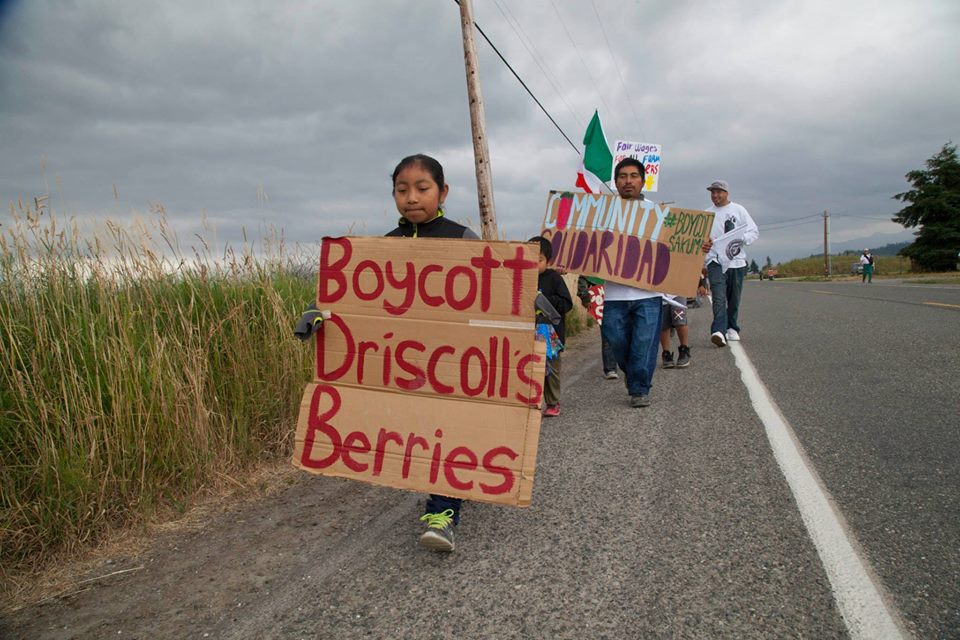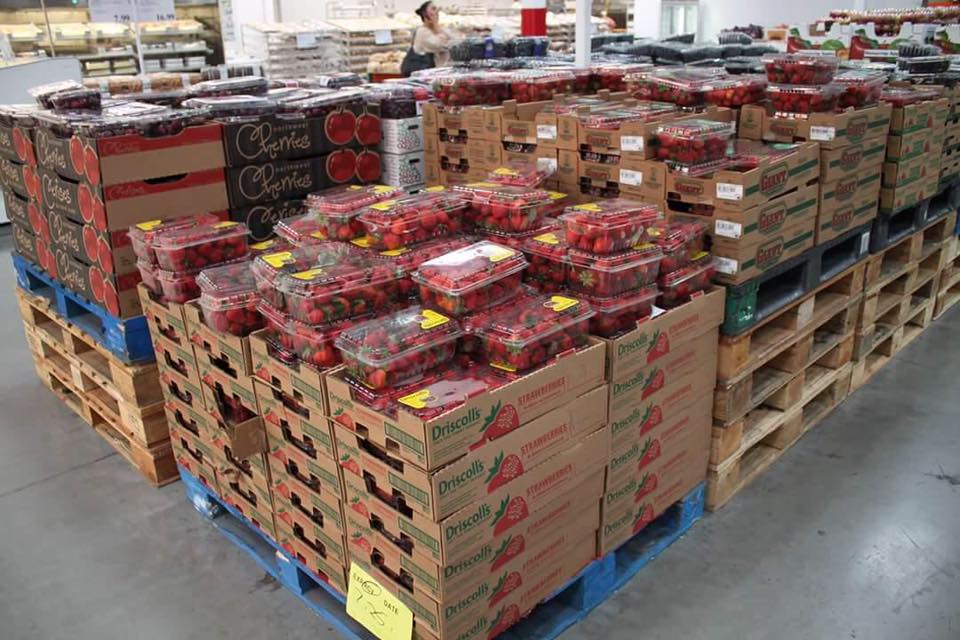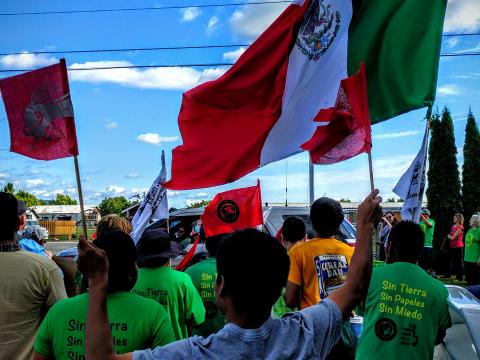For over three years, the workers at Sakuma Brothers farms in Burlington, Washington have been calling for a boycott. The farm supplies strawberries, raspberries, blueberries, and more to Driscoll’s, the largest berry distributor in the world, and over the years, the workers have complained of inconsistent, piecemeal wages (that dipped below minimum wage), poor housing conditions, and the absence of paid break time.
Now, the workers have reached an important milestone: In September, they voted to be represented by Familias Unidas por la Justicia (FUJ), the first farmworker union led by workers who are indigenous to Central America. And they’ve called off the boycott for now. “This win ushers in a new era for farmworker justice internationally,” said FUJ in a statement.
Washington is the number one state in red raspberry production, number two in blueberry production, and number five in strawberries in the nation. Skagit County, where Sakuma Brothers is located, is Washington’s top strawberry producer. That crop is worth about $20 million annually. What happens in those berry fields is big business; the U.S. ranks number one in world blueberry production and number three for raspberries. Undoubtedly, labor relations in this industry can have a worldwide impact.
As FUJ spokesperson Maru Mora Villalpando told Civil Eats, “What workers wanted from day one, was to establish a process where they can negotiate directly with the management.” Now that’s what they’ll have. She also believes the group can set an example for other farms throughout the state.
“For these indigenous farmworkers, many of whom don’t speak Spanish or English, fighting for four years for the right to have a union—and winning that right—is tremendous,” said Food First executive director Eric Holt-Giménez.
Driscoll’s Americas executive vice president Soren Bjorn says the company is also “pleased with the outcome” of the election. “All along, we said that workers had the right to associate and if they want someone to represent them, they should have those rights and that should be honored,” said Bjorn.
He added that unionized workers are a rarity for Driscoll’s U.S. farms. While a number of berry pickers in Mexico work with unions, in California, where the company has most of its production, Bjorn said: “I don’t think we have anyone that is unionized,”
While Sakuma Brothers CEO Dan Weeden told Civil Eats that FUJ has “made a lot of claims, a lot of false claims and accusations,” about working conditions, he too supports the workers’ right to organize. “At the end of the day, if the workers want this, it needs to be their decision,” said Weeden.
Long Struggle and Landmark Strides Along the Way
This outcome did not come easily. “Through the past three years, workers have used different tools to press the company,” explained FUJ’s Villalpando. In addition to the boycott, tactics included strikes and walk-outs.

Although the workers have ended their boycott, Holt-Giménez says he’s personally going to wait until FUJ has negotiated a contract with Sakuma Brothers. “I’m not signing a contract with Sakuma Brothers and neither are any other consumers. Even though FUJ has called off their boycott, I think it’s important for the rest of us to maintain the boycott to continue to apply pressure for a successful outcome,” he said. (Update: Some activists are also encouraging consumers to continue the boycott due to the treatment of workers on Mexico’s Baja Peninsula.)
Over the years, Sakuma Brothers workers have won other important victories. In 2015, the Washington Supreme Court decided unanimously in their favor when they asked to be paid for rest breaks in addition to how much fruit they picked. The court also said workers must be paid for rest break time at the same rate they earn when they’re picking, not just the minimum wage. This decision applies not only to Sakuma Brothers farmworkers, but to all of Washington state’s estimated 200,000 seasonal farmworkers.
As Villalpando explained, Sakuma Brothers’ berry harvesters, like many other Washington farmworkers, are paid a piece rate for how much they pick. “Workers don’t know each day how much they’re going to be paid,” she explained. Weeden says the company’s farmworkers make an average of $17 per hour, with some earning $20, $30 or more an hour. But this is based on the volume picked, and is never a guarantee. Neither the company nor FUJ are sharing details of the negotiations but The Strangerhas reported that the union will be asking for a guaranteed minimum of $15 per hour.
Wages have not been the only issue for Sakuma Brothers workers. They’ve also been fighting for the right to organize and over housing policies.
In 2013, when organizing efforts began, the company reportedly hired security guards to patrol the farm’s labor camps. When workers went on strike in protest, many were fired.
But in 2014, a local Superior Court agreed with workers that this was an intimidation attempt and that workers who had gone on strike should not be barred from returning to their jobs. Workers had also complained that farm staff had used racist and disrespectful language—and often in relationship to the workers’ indigenous identities.
“Most FUJ workers are from the Oaxaca and Guerrero regions of Mexico and speak Mixteco and Triqui,” Villalpando explained. “Some are bilingual in Spanish and some are trilingual in English as well,” but not all, she said.
Sakuma Brothers workers also brought a court case against the company for a housing policy to exclude their families from company housing, which they said was imposed as retaliation for their effort to unionization. The farmworkers also won that battle when the same court told the company it had to provide housing for workers’ families—not just the workers themselves.
“It is really David and Goliath,” said Holt-Giménez. “It also a testament to the courage of the farmworker families. If they’ve gone out on strike, and they’ve been doing this for four years, it means conditions have been unacceptable,” he said.
Sakuma Brothers’ Weeden maintains that the company’s pay is among the highest in their industry and that housing conditions are good. Both Driscoll’s and Villalpando say improvements have been made since 2013.

Big Demand for Perfect Fruit at Low Prices
"I don't think people realize how difficult and how challenging it is to be a family farm like Sakuma Brothers,” said Weeden. Climate change, weather, market prices, and competition from other countries with lower prices are all challenges, he explained.
A lack of “workable, logical immigration laws,” is another big challenge, said Driscoll’s Bjorn. The fact that the U.S. National Labor Relations Act does not cover agriculture also means farm owners in most states—including Washington—don’t have a clear legal process to follow when workers want to unionize.
As the largest berry provider in the world, Driscoll’s has “a tremendous amount of leverage in the marketplace and in what they can demand from their suppliers,” said Holt-Giménez. And allowing workers to organize and conduct equitable negotiations with farm owners to secure good labor conditions is essential to supplying “good, clean berries,” he explained.
“Sakuma Brothers has always been one to take the high road,” said Weeden. “What we want more than anything is to make sure we’re doing things right. Our company is just trying to figure out how to survive,” he said.
And companies like Driscoll’s have raised market expectations in ways that put pressure on farmworkers, Villalpando explained. “People want fruit throughout the whole year. There’s a big demand to have fruit and vegetables that are perfect at a very cheap price,” she said. “These berries are seasonal and we should understand how difficult it is to pick them,” she added. If the price of berries has to rise, that would mean “you’re actually contributing to better labor conditions of those who work in the fields,” she explained.
Of FUJ’s achievement she concluded, “This is an historical move. It’s a huge honor to support this movement.”
Photos courtesy of Familias Unidas por la Justicia.
[Elizabeth Grossman is a senior reporter for Civil Eats focused on environmental and science issues. She is the author of Chasing Molecules, High Tech Trash, Watershed and other books. Her work has appeared in a variety of publications, including Scientific American, Environmental Health Perspectives, Yale e360, Ensia, High Country News, The Pump Handle, Chemical Watch, The Washington Post, TheAtlantic.com, Salon, The Nation, and Mother Jones.]


Spread the word